Blog

Reclaiming the Flow of Time amid War
War unravels our sense of time. Hours stretch or collapse, and people find themselves between a past that feels out of reach and a future too uncertain to imagine. Drawing on numerous testimonies from Ukrainians since February 2022, as well as the author’s own experiences, this essay by sociologist Natalia Otrishchenko for re/visions journal examines how people strive to reclaim time amid war – often through simple rituals that help anchor their lives.
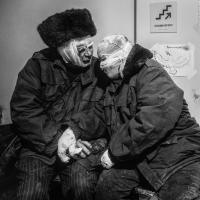
Bakhmut, November 17, 2022. A Photograph by Eddy van Wessel
In this article for the fifth issue of the monthly journal re/visions, art critic and researcher Kateryna Iakovlenko analyses a striking photograph, capturing a wounded elderly couple clinging to one another after their home was destroyed by a Russian missile strike. Iakovlenko compares this image to other artistic works dealing with the so-called “human face of the war” and reflects on how viewers interact with pieces demonstrating the horrors of armed conflict.

Near the Frontline, a Sense of Closeness Coming Virtually Out of Nowhere
In his article for the sixth issue of the monthly journal re/visions, theater director Pavlo Yurov, who serves in Ukraine’s National Guard, reflects on different kinds of friendships that grow among those who serve in the Armed Forces. He meditates upon moments that forge a “second family” amid war and describes various encounters with his brothers in arms. Yurov is convinced that war reshapes intimacy, revealing the human instinct for closeness, and this text is a testament to that idea.
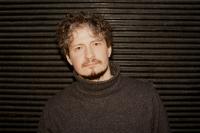
Fear Is Not the Strongest Emotion: An Interview With Yuri Rechinsky
In this article for the Polish online magazine Dwutygodnik, film critic Natalia Serebriakova interviewed Yuri Rechinsky, Ukrainian director, editor, and screenwriter. In the following conversation they discuss Yuri's upcoming film Dear Beautiful Beloved, as well as his other works, Ugly and Sickfuckpeople. Yuri shares his experiences as a filmmaker, whose works grapple with challenging societal issues, and explains his motivation to return back to Ukraine to take part in the life of the country during wartime.

The Story of a Girl
In the Dwutygodnik article, Ukrainian activist Olena Apchel shares her personal experience of loss and mourning shaped by wartime realities. She reflects on family memories, the long grieving process after her mother’s death, and feelings of loneliness. She also describes her experiences and her involvement during the early days of the Maidans in different cities, and the harassment, interrogations she faced, as well as the struggles with identity and the pressure to be “good enough” to fit into society. Now, she is learning to accept her experiences and continue living with them.
Unbroken: Igor Efimov Captures Dignity of the Country’s Wounded
Dedicated to the consequences of Russo-Ukrainian war, Igor Efimov’s project Unbroken is a continuation of his documentary photographic practice. Since 2014, Efimov has worked on projects about wounded servicemen and the families of Ukraine’s fallen heroes. By focusing on personal stories, the author reveals the shared pain of loss and the strength of the human spirit to endure it.

Bucha: My Visit to the Past
In this article for Dwutygodnik, Ukrainian translator Olena Liubenko recounts her personal experience of living under the occupation in Bucha and evacuating to Kyiv. Her essay is an inquiry into physical and mental impacts of occupation. She describes living through active warfare as a sort of chasm, with former peaceful life on one edge and a new life within an insurmountable distance. Liubenko claims that only those who are willing to accept that we are destined to look evil straight in the eye will get to the other side.
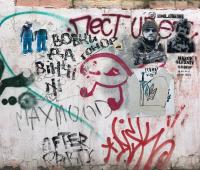
Documenting Wartime Graffiti and Inscriptions in Public Spaces
As part of the project The Language of Walls: Informal Communication in Public Spaces During Times of Crisis, Documenting Ukraine grantee Anton Hauk examined graffiti and inscriptions in Ukraine and abroad. Hauk analyzed these graphic manifestations, which appear on city streets, iconic landmarks, and destroyed equipment, as expressions of societal narratives and emotion.

Speaking about Crimea: An Interview with Svitlana Taratorina
In this article for Dwutygodnik, literary critic, researcher and writer Tetiana Petrenko interviewed Svitlana Taratorina, Ukrainian fantasy author. In the following conversation they discuss how literature emerges in times of war, Taratorina's books, and the image of Crimea in texts and films.
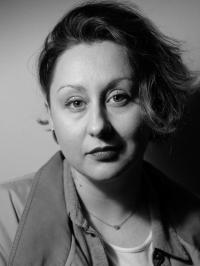
Music in Wartime and Its Place in Ukraine’s New Realities
In a new radio documentary called What Music Means to Me, musicologist and Documenting Ukraine grantee Kateryna Honcharuk explores the contemporary soundscape of Ukraine, music therapy for soldiers, music in rituals of remembrance, and new works composed to the sound of sirens. The premiere aired on Ukraine’s Radio Kultura on 1 October 2024 — International Music Day and Ukraine’s Defender’s Day.
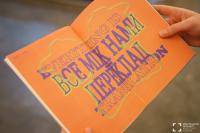
Translating the Human Experience at the International Book Arsenal Festival
This year’s Book Arsenal took place from 29 May to 1 June, marking the third edition of the festival held since the full-scale invasion. The Documenting Ukraine program was honored to support the implementation of the focus theme as well as to co-organize the panel titled Building Bridges.
In 2024, the focus theme Life on the Edge, curated by Volodymyr Yermolenko and Tetyana Ogarkova, explored the boundaries between the frontline and the rear. This year, under the curation of Oksana Forostyna, an editor, author, translator, and political analyst, and Marci Shore, a professor of intellectual history at the University of Toronto, participants explored the topics of translation and untranslatability, the complexity of communication, and the role of the Ukrainian language in the modern cultural landscape. Here we offer a look back at the focus theme discussions that took place in Kyiv.
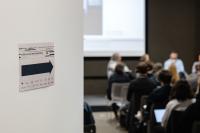
Enacting Archives at the Most Documented War Symposium
From 22 to 24 May, archivists, oral historians, librarians, journalists and academics have once again gathered in Lviv for the annual Most Documented War symposium, co-organized this year by the IWM, the Center for Urban History, INDEX: Institute for Documentation and Exchange, and Research Centre Ukraine / Max Weber Foundation. This year's discussions centered on the concept of archive and its various aspects, from practical issues of preservation, access and safety to using archival materials for storytelling and justice. The Symposium provided an opportunity to evaluate intermediate results of wartime documentation, as well as a platform for networking and reflection in what can often feel like an isolating field.
This retrospective is a brief overview of the many discussions that took place in Lviv around various aspects of establishing and enacting archives.

1989: The Power of Taste
In this article for Dwutygodnik, Ukrainian writer and intellectual Oksana Forostyna examines how the rapid transformations in Ukrainian society over the past 35 years have led people to project their present selves onto the past. She reflects on her upbringing in Lviv and discusses the contrasting perceptions of Poland and Ukraine in that era, emphasizing that Poland, despite its economic poverty, had access to Western aesthetics and culture. The article delves into the complexities of historical memory and identity, questioning the narratives that have shaped Ukrainian society's understanding of its past and its relations with neighboring countries.

A Space Where the Future is Possible: An Interview with Sofia Andrukhovych
In this article for Dwutygodnik, culture critic and Documenting Ukraine grantee Anastasia Platonova interviewed Sofia Andrukhovych, Ukrainian writer and transaltor. In the following conversation they discuss how the author's perspective and approach to writing have evolved over nearly three years of full-scale war, as well as Sofia's new book.
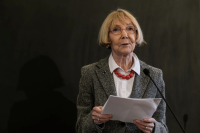
In Isolation: A Conversation with Ewa Thompson
In this article for Dwutygodnik, culture critic and Documenting Ukraine grantee Anastasia Platonova interviewed Ewa M. Thompson, Professor Emerita of Slavic Studies at Rice University. Here we present excerpts from their conversation, in which they discuss Russian imperialism in the 21st century, colonial narratives embedded in Russian literature, as well as cultural relations between Russia and the West.

Not Reconstructing, But Rebuilding
Reconstruction is not only a material process but also a mental one, a transformation that would allow Ukraine to finally break away from the legacy of its existence within the Soviet empire.
This article is part of the collaboration between the IWM and the Polish online magazine Dwutygodnik. As part of this collaboration, we report on various aspects of the Ukrainian experience during the war and explore in particular the dynamics of Ukrainian cultural life. For the following article, Dwutygodnik journalist Paweł Knut spoke with Ukrainian curator and architect Petro Vladimirov about the reconstruction process of Ukraine. Together they examine the imperial and social context of this process and draw historical comparisons.
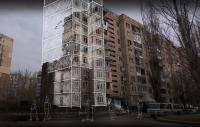
Sviy Dim. Documenting the Destruction of Civilian Infrastructure in Ukraine
Journalist Haiane Avakian received a repeat Documenting Ukraine grant on behalf of the Sviy Dim media platform. In their projects, the Sviy Dim team documents the destruction of civilian infrastructure in Ukraine caused by the Russian aggression.
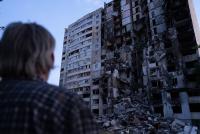
Three Years On: Ukraine Stands at the Frontline of Defending Europe’s Freedom
For better or worse, three years after Russia’s full-scale invasion, the global attention is once again focused on Ukraine. This is because Ukraine stands at the heart of what is at stake today: the struggle for a democratic order.
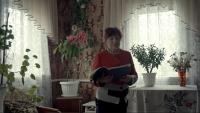
A New Tribe: Ukrainian Documentary Filmmaking
In the following article, Ukrainian film critic and cultural journalist Dmytro Desiateryk from Dwutygodnik describes recent developments in Ukrainian documentary filmmaking and analyzes the war's role in shaping contemporary Ukrainian cinema. Desiateryk thus addresses a topic at the core of the Documenting Ukraine program which, through its grant scheme, supports numerous Ukrainian filmmakers in capturing the diverse experiences of the war.
Documenting Environmental Changes Caused by the Destruction of the Kakhovka Reservoir
Documenting Ukraine grantee Oleksii Vasyliuk and his team at the Ukrainian Nature Conservation Group investigate environmental changes caused by the destruction of the Kakhovka Reservoir. The team will soon publish their research results covering economic damages, wildlife losses, destruction of biodiversity, and contamination of soil. Here, we give a short overview of their findings.
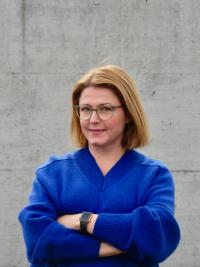
We Need New Vocabulary. A Conversation with Kateryna Botanova
In a moment when everything is burning, painful, and terrifying, it is hard to hold on to a long-term perspective. But if we don’t hold on to it, we will lose everything. If we don’t think about it, we’ll lose future futures—yes, in the plural.
In the following conversation, Ivanna Skyba-Yakubova from Dwutygodnik and Documenting Ukraine grantee Kateryna Botanova discuss the current Ukrainian discourse on decoloniality, forms of solidarity, and cultural memory. They reflect on how to find a new language under fateful circumstances.
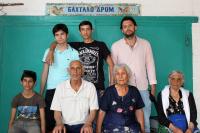
Roma and War. Documenting the Impact of the Russian Invasion on Ukraine’s Roma Community: A Project by Mykola Homanyuk
A new publication by Documenting Ukraine grantee Mykola Homanyuk (Kherson State University) and his colleagues compiles their research results on the impact of the Russian war on Ukraine’s Roma community. Homanyuk examines changes in Roma identity since the Russian full-scale invasion, Roma strategies of adaptation, but also various forms of discrimination experienced by displaced Roma in Ukraine and the EU.
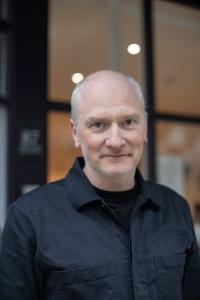
Catalog of Crimes and Courage: Interview with Maksym Demydenko from "Ukraine War Archive"
This article is part of the newly established collaboration between the IWM and the Polish online magazine Dwutygodnik. As part of this collaboration, we report on various aspects of the Ukrainian experience during the war and explore in particular the dynamics of Ukrainian cultural life. The articles coming out of this collaboration are first published in Ukrainian and Polish and then translated into English for Documenting Ukraine.
For the following piece, Dmytro Desiateryk from Dwutygodnik looked at initiatives of war documentation and interviewed Maksym Demydenko, one of the creators of the "Ukraine War Archive" (UWA), a non-profit collaborative digital preservation platform that creates a unified register of materials related to the Russian full-scale invasion of Ukraine.
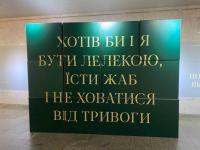
“I Wished I Was a Stork…”: The Children of War and Their Stories
Within the scope of her project A Thread of Memory (The Voices of Witnesses), Documenting Ukraine grantee Kateryna Yehorushkina is working on a book of literary reports based on conversations with witnesses of Russian war crimes. In the following text, she reports on testimonies of Ukrainian children and their experiences of the war.
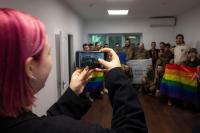
Unicorn Battalion: A Project by Sasha Maslov, Renowned Ukrainian Photographer and DocU Grantee
The struggle of the queer community in Ukraine takes place on many frontlines: Its fight against the Russian invader is not only one against occupation but also one for personal freedom and against potential prosecution under a Russian occupying regime. Many members of the Ukrainian LGBTIQ+ community have therefore decided to take up arms and fight the aggressor. Meanwhile, they are confronted with prejudices and discrimination within their own society.
For his article, titled “Unicorn Battalion,” DocU grantee and renowned photographer Sasha Maslov visited the 2024 Kyiv Pride, met with various military service members on the frontlines, and reported on their experiences as defenders of a free Ukraine.
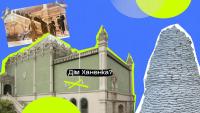
Ukraine at the Venice Biennale, Years of Attention – 1914, 1993, 2025–2026
The Venice Biennale continues until November 2024. The Ukrainian art is presented in the National Pavilion of Ukraine and Poland, as well as at exhibitions of the Collateral Events. This year's Ukrainian Pavilion, titled Net Making, consists of four mixed-media projects, as well as a public program with lectures and performances. The Documenting Ukraine program is proud to support the Pavilion and the work of Documenting Ukraine grantees featured at La Biennale di Venezia.
Curator and critic Borys Filonenko tells the story of the Ukrainian presence at the Venice Biennale for Suspilne Kultura and talks about how Russia continues to promote its narratives.

“Only Love Is Worth Fighting For”: Iya Kiva on Her Home in Donetsk, Its Loss, and Poetry That Reflects the Heart of Our Country
Ukrainian poet, translator, and critic Iya Kiva is one of the prominent figures in contemporary poetry.
Kiva’s texts are filled with pain and loss, but also with much love, empathy, and tenderness towards other people, the environment, and cities that are becoming distant and changing as a result of the war. In her poetry, Iya brings the lost closer—she speaks about home, memory, and history. She writes about the life of a person who finds themselves in a war and tries to make sense of it through thoughts and simple actions.
In an interview with Suspilne Kultura, she talks about the poetry of the Ukrainian home front created by women's voices, about displacement and the loss of home, as well as about the healing that can come after loss.
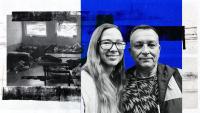
Viktor Moskalenko: “What I Had Already Read About Chechnya Saved Me in Captivity…”
Kateryna Yehorushkina is a Ukrainian writer and the author of more than twenty books, the rights to which have been sold in ten countries (USA, Great Britain, Denmark, Sweden and others). She is a member of PEN Ukraine and a TEDx speaker. Kateryna's books have won national and international awards. With the support of the Documenting Ukraine program, she is currently working on a book of literary reports based on conversations with witnesses of Russian war crimes. For Suspilne Kultura, she tells the story of a farmer who hid a command-and-control vehicle in his hangar at the request of the Armed Forces of Ukraine and survived Russian captivity.
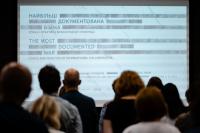
Lessons in International Collaboration from The Most Documented War Symposium
The annual Most Documented War symposium is a space for encounter and exchange between Ukrainian and international documentation and archiving initiatives. Launched in 2023 as a joint initiative of the Documenting Ukraine program, the Center for Urban History, and the Center for Governance and Culture at the University of St. Gallen, The Most Documented War aimed to open a discussion around sustainable archival infrastructures for projects documenting the Russo-Ukrainian War. This was a moment when the initial urgency of documentation was giving way to the need to develop lasting institutions to host materials from what has frequently been deemed the most documented war. Thus the first edition of the symposium centered around finding effective practices of digital archiving, as well as legal, ethical and technological challenges that arise while dealing with sensitive personal data.
This year, The Most Documented War continued its exploration of archiving and documentation by focusing on their collaborative elements. With input from Ukrainian and international experts, the symposium aimed to problematize certain aspects of international cooperation, such as mobility challenges, differences in legal and administrative frameworks, emotions and knowledge production, and varying modes of work and expected results.
In this retrospective, we reflect on the main takeaways from The Most Documented War’s many workshops, panel discussions, informal meetings with friends and colleagues during lunches and coffee breaks, as well as insights from the presentation of the new book series Stories of War.
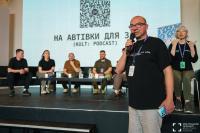
Reflections on Life on the Edge from the Book Arsenal
For the second year in a row, the Documenting Ukraine program was honored to partner with the Book Arsenal festival to reflect on topics related to the Ukrainian experience of the full-scale Russian invasion. In 2023 the focus theme of the festival, When Everything Matters, was curated by Ukrainian journalist and co-founder of the Public Interest Journalism Lab Nataliya Gumenyuk. It was an attempt to verbalize what is happening to Ukraine, its society, and the world in general. This year’s festival took place 30 May–2 June under the focus theme Life on the Edge, curated by Volodymyr Yermolenko and Tetyana Ogarkova.
Life on the Edge is an exploration of boundaries between the frontline and the rear, civilians (and civilian life) and the military, and how these seemingly opposed categories intertwine in the daily lives of Ukrainians during the full-scale Russian invasion. The program is a tribute to those who dare to go beyond the edge – soldiers, paramedics and volunteers – as well as those who decided to stay.
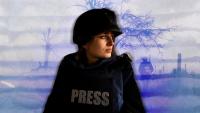
It Seems Like Death is Constantly Breathing Down my Neck: Producer and Journalist Vasilisa Stepanenko on “20 Days in Mariupol”
The Ukrainian film 20 Days in Mariupol, which documents Russian crimes against humanity, won the award for Best Documentary Film at the Oscars 2024.
Mstyslav Chernov, Evgeniy Maloletka, and Vasilisa Stepanenko’s film has been shown around the world and used as evidence of Russian aggression.
How did the journalists produce this film? How did they select the stories and find the most precise, essential words of support for their heroes? And, indeed, how have they consistently found the right words to communicate the ongoing tragedy in Ukraine to people worldwide?
Exclusively for Suspilne Kultura, Ievgeniia Gubkina, a Ukrainian architect, architectural historian, and curator from Kharkiv specializing in 20th-century architecture and urban planning in Ukraine, spoke with the film's producer and journalist Vasilisa Stepanenko. They discussed preserving empathy during wartime, the themes of humanity and anger, and the making of the film 20 Days in Mariupol.
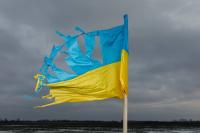
Longing for the Anniversary Ukraine Will Celebrate, Not Just Mark
Since 21 November last year, the same date the Revolution of Dignity began on Maidan Nezalezhnosti in Kyiv in 2013, Ukrainians have marked a string of anniversaries. Ten years since the people of Ukraine won the right to choose a future in democratic Europe. Then ten years since protesters on Maidan were killed by special forces on 20 February 2014; later they came to be called the Heavenly Hundred. On that same day, Crimea was annexed by the Russian Federation. These are national anniversaries that Ukraine never celebrates; they are days that will be forever marked in black in every calendar, regardless of how many years have passed.
This is how the “Ukraine crisis” began a decade ago. This was the start of an internationally unrecognized hybrid war waged by Russia. It lasted until the events of 24 February 2022 shook Ukraine with massive explosions. This date, this “youngest anniversary,” marks Ukraine’s most profound grief in modern history.

"20 Days in Mariupol" and What Will Be the Future of Ukrainian Cinema?
The debut documentary by Ukrainian journalist Mstyslav Chernov is gaining momentum among audiences and critics alike. On February 18, the film documenting the siege of the Ukrainian city of Mariupol, won the BAFTA Film Award in the Documentary category. 20 Days in Mariupol not only shows the true face of the Russian invasion of Ukraine, but also invites foreign audiences to engage with other Ukrainian films.
The reception of the film, both domestically and internationally, opens a wider discussion about Ukrainian cinema, its promotion abroad and the relationship between Ukrainian filmmakers and their foreign counterparts, the role of the state in the cinema industry. In her column for Suspilne Kultura, film critic and cultural journalist Daria Badior reflects on the future of Ukrainian cinema and the importance of 20 Days in Mariupol being nominated for the Academy Awards 2024.

Now Home Is Everywhere: How Culture Brings Us Together During Wartime and Helps Us Embrace Others
What is the unifying role of culture during wartime? Maria Semenchenko reflects on the meaning of home that people find inside them and everywhere in Ukraine. Member of the PEN Ukraine and an author of the best interview according to the contest „Honor of the Profession“ 2022, she talks and listens to people traveling across the border of Ukraine and shares her insights with Suspilne.Kultura, in collaboration with the Documenting Ukraine program.
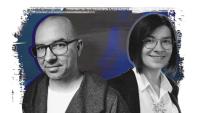
“If we fragment as a community, we definitely won't survive.”: Volodymyr Yermolenko in conversation with Iryna Slavinska
Ukrainian philosopher and writer Volodymyr Yermolenko became the president of PEN Ukraine in November 2022. In 2020, he co-founded the Kult podcast with journalist and literary critic Tetiana Ogarkova, where they discuss Ukrainian and global culture and how it figures in the context of world intellectual history, the impact of war, and a post-colonial perspective.
Yermolenko is a winner of the Yuri Shevelov Prize (2018) and the Petro Mohyla Prize (2021), he was a Ukraine in European Dialogue Visiting Fellow at the IWM in 2021 and in 2022 became a grantee of the Documenting Ukraine program. He is the author of numerous articles on Ukraine, Europe, and global processes in Ukrainian and international media. He is also a frequent speaker on Ukrainian cultural processes in the West. Currently, he serves as the editor-in-chief of UkraineWorld.org.
Speaking exclusively with Iryna Slavinska for Suspilne Kultura, Volodymyr Yermolenko discussed the impact of war on Ukrainian culture, volunteering, and the need for a new social contract.
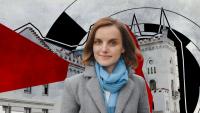
"It’s Important For Us to Develop the Cultural Ecosystem”: An Interview with Bozhena Pelenska, Director of the Jam Factory
The Lviv project Jam Factory can confidently be called one of the longest-running artistic construction projects in Ukraine. The transformation of the space of the former jam factory into a multidisciplinary cultural center began in 2015. The process was interrupted, transformed, and finally, in the fall of 2023, after eight years of work, the project was publicly presented to the world.
In an interview for Suspilne Kultura, Documenting Ukraine grantee Anastasiia Platonova spoke with Bozhena Pelenska, the director of Jam Factory, about what it was like to launch a massive cultural institution in the second year of a full-scale war, the ambition required to develop Ukraine’s artistic ecosystem, and future plans for the Jam Factory.
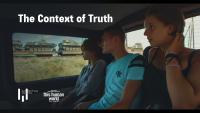
Translating the Abrupt Reality into Common Language
We are witnessing history in the making. As we screen films that show what has already happened, we remain mindful that other events are taking place right now. The filmmakers whose work is presented within the program entitled “The Context of Truth”, began instinctively recording what they saw and came to realize that they were capturing something that—most probably—will be gone forever. They are not just recording the war, but keeping alive the memory of what has been lost: places, people, normality. Even during the war, people in Ukraine are dining in restaurants, getting haircuts, dancing, and watching films. But when they leave the dark cinema hall, they return to a life full of almost the same images that they just saw on the screen.
Katherine Younger, a Permanent Fellow at the IWM, and Kseniya Kharchenko, Documenting Ukraine Project Manager, in a conversation on the careful choice of messages about the careless reality of war.
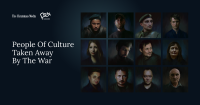
“People of Culture Taken Away by the War”
“People of Culture Taken Away by the War” is a series of literary portraits designed as an online project and launched by PEN Ukraine and The Ukrainians Media. While working on the stories, the project team researches the fallen heroes’ heritage and talks to their relatives and colleagues. The special project is aimed to preserve the memory of the people of whom the war has deprived the Ukrainian culture and to testify about Russia’s genocidal intentions.
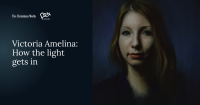
Preserving the Canvas of Culture
Sasha Dovzhyk, Ukrainian writer, literary scholar and curator of culture projects, Documenting Ukraine grantee and a former fellow at the IWM—about the work of memory and creating the chronicle of the losses of Ukrainian culture.
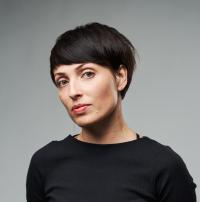
Theory and the Practice of Context
At this year's this human world – International Human Rights Film Festival a program titled "The Context of Truth," dedicated to Ukraine will be featured. In her curatorial statement, Olga Birzul reflects on how the entire world has become hostage to Russian propaganda, the crisis of empathy, and the power of solidarity in resisting Russian aggression.

Learning to Understand Suffering Different from One's Own: Aliona Karavai's Conversation With Yurko Prokhasko About Loneliness
Yuri Prohasko is a Ukrainian literary scholar, psychoanalyst, and publicist from Ivano-Frankivsk. Among other works, he has translated Rainer Maria Rilke and Franz Kafka from German, Deborah Vogel from Yiddish, and Leszek Kołakowski from Polish into Ukrainian.
Aliona Karavai is a cultural manager from Donetsk, co-founder of the media outlet post impreza, and the director and curator of the Assortment Room in Ivano-Frankivsk.
At the request of Suspilne Kultura, Aliona Karavai and Yurko Prokhasko spoke about loneliness, love, and how war vividly illustrates virtues and vices.
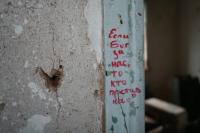
Great Motherland, Soviet Nostalgia, Illiteracy, Twisted Shame and a Bit of God: What’s Behind the Inscriptions on the Walls
According to the Ukrainian activists documenting graffiti left by the Russian occupiers in Ukraine, the devil is in the details. In times of war, even such seemingly mundane things as writings on walls and even school boards help us in creating the profile of the aggressor, decoding their motives and nature, as well as proving that the Russo-Ukrainian War is far more than the war of Vladimir Putin, the only person responsible for it.

Responsibility Means Responding: Aliona Karavai on Institutional Mistakes, Colonialism, and Resentment Towards Russia
Aliona Karavai, a contemporary art curator, discusses the situation surrounding the exhibitions "As Though We Hid the Sun in a Sea of Stories: Fragments for a Geopoetics of North Eurasia" and "The Assault of the Present on the Rest of Time" in Berlin.

The Place of 'Russian Romanticism' and Ukrainian Art: A Conversation with Roman Khimey and Yarema Malashchuk
Roman Khimey and Yarema Malashchuk are known for their experiments with the forms of video and cinema, which have become iconic in art and film. Their documentary film "Zarvanytsia" (2021) was featured in several film festivals. Khimey and Malashchuk are winners and laureates of awards, and their artistic works have been exhibited in numerous exhibitions in Ukraine and beyond. In June 2023, they participated in the exhibition "Documenting Ukraine: Bearing Witness to War" with a short film about the looted Kherson Museum (which recently received an award at the 4:3 Short Film Festival in Ivano-Frankivsk).
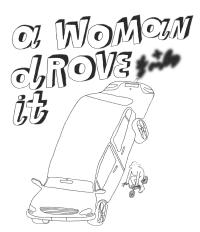
A Woman Drove It: Zhenya Oliinyk About the Evacuation
Zhenya Oliinyk, an illustrator and cartoonist from Ukraine, wrote a story about the female evacuation right after the full-scale Russian invasion of Ukraine started. Women drove various vehicles, taking their families, pets, friends, and those who asked for help as far from the war as they could. Many then said that driving was a life-saving skill worth getting only for this unbelievable—who believed that "big war" is possible in the 21st century?—purpose.
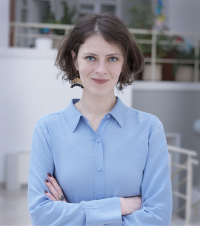
Sasha Dovzhyk: “Our Current Resistance Is Rooted In History”
Sasha Dovzhyk is a Ukrainian writer, literary scholar, and curator who explores the past through literature and documents the present via eyewitness testimonies of survivors of the Russo-Ukrainian war. In her opinion pieces and essays for foreign audiences, she reflects on the changes that have taken place in Ukrainian society in recent years and the impact of Russia’s full-scale aggression, including her personal transformations. In this candid interview that was taken in November 2022, presented as a monologue, Sasha reflects on the ways for her to contribute to Ukraine's victory and on the traditions of Ukrainian resistance. Dovzhyk is a grantee of the Documenting Ukraine program at IWM who participated in a series of discussions under the title "Documenting Ukraine: Bearing Witness to War."
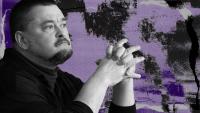
Volodymyr Rafeyenko: "We Are a People Who Give Birth to Ourselves"
Volodymyr Rafeyenko, award-winning Ukrainian writer, poet, translator, literary and film critic, and author of the novels The Length of Days and Mondegreen: Songs about Death and Love, reflects on the true meaning of the word "freedom" and how independence is being shaped.
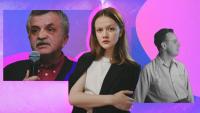
When the Past Has Your Back: Bohdana Neborak on Artists and Works That Become Contemporary
The chief editor of The Ukrainians and cultural manager Bohdana Neborak writes about ‘ours’ and ‘theirs,’ as well as what modernity is and why the ideas of Shevelov and Malaniuk are still fresh.

How Are You? A Column About Love, Hate, Songs, and How Worldbuilding Is Falling Apart
In her text, curator and cultural project manager Oksana Shchur reflects on the project "Ukrainian Songs of Love and Hate," featuring Lyuba Yakymchuk, Irena Karpa, Yuriy Gurzhy, Grigory Semenchuk, as well as translators Oleh Kolesnikov and Anna Paschenko, and visual artists Grycja Erde and Yevheniy Arlov.
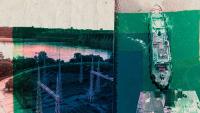
Nuclear Anxiety of the Wild Fields: On the Zaporizhzhia Nuclear Power Plant
Deception, speculation, and fears regarding the possibility of a terrorist act at the Zaporizhzhia Nuclear Power Plant (NPP) — in a column from Sasha Dovzhyk, special projects curator at the Ukrainian Institute London and associate lecturer in Ukrainian at University College London.
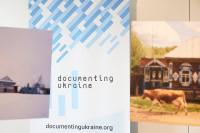
Opening of the Exhibition “Documenting Ukraine: Bearing Witness to War” at Bildraum Studio
On 2 June 2023, the exhibition “Documenting Ukraine: Bearing Witness to War” will be officially opened. The exhibition, organized in cooperation with Bildrecht and FOTO WIEN, will be held from 2 June to 1 July 2023 at Bildraum Studio.
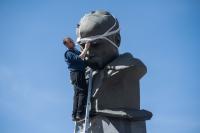
Documenting Ukraine and Ukrainians
Serhii Korovayny has been documenting the Russo-Ukrainian War since its start in the Donbas in 2015. His wide-ranging work, which has been supported by Documenting Ukraine, captures daily life during wartime, Russian atrocities in Ukraine, environmental issues, displaced people, and healthcare topics, among other themes. His photographs will be presented as part of the exhibition Documenting Ukraine: Bearing Witness to War at Bildraum Studio in Vienna from 3 June till 1 July 2023.
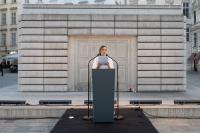
A Speech to Europe 2023 by Oleksandra Matviichuk
On 9 May, Oleksandra Matviichuk, Head of the Center for Civil Liberties, delivered this year's Speech to Europe on Vienna's Judenplatz. Under the banner “No Peace without Freedom, No Justice without Law,” the Ukrainian lawer and human rights activist underlined the importance of international solidarity and resistance against injustice. Read the full transcript of her speech in English here.

A Year Ago, We Survived a Terrorist Attack at the Kramatorsk Railway Station. Our Very Lives Are Open Wounds
On 8 April, a terrorist attack struck the Kramatorsk railway station. Russian troops shelled civilians who wanted to flee to safe regions. The enemy’s two Tochka-U cluster missiles killed 61 and wounded 121 people. Among them are the heroes of this article: Anastasiia Shestopal, Vladyslav Kopychko and Kateryna Iorhu. They were severely wounded, and subsequently underwent painful surgeries and rehabilitation procedures. Below is what happened to them during the six months following the terrorist attack that changed their lives forever. The material was created for Svoi.City within the framework of the Life of War project supported by the Public Interest Journalism Lab and the IWM.
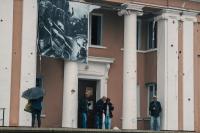
Stories from the liberated Kharkiv region: A Life in War project by Zaborona Media
As a result of Ukraine’s first counteroffensive in September 2022, the Armed Forces of Ukraine liberated nearly the entire Kharkiv region, one-third of which was occupied by Russian forces. Liberation revealed similar sights to what the world had witnessed in Bucha and Hostomel in the Kyiv region in April 2022; torture chambers and mass graves were found in towns and villages. These findings are not the only evidence of massive atrocities that took place under occupation in Izium and Balakliia. Seven months have passed since the liberation of the Kharkiv region; as Ukraine prepares for another counteroffensive, it is a fitting moment to recall the sorts of experiences they are liberating Ukrainians from. Here we look back on what Ganna Sokolova, a journalist with Zaborona Media, found upon first coming to the liberated territories.
This is the first in a series of blog posts that will highlight the work of Ukrainian media organizations as part of the joint project Life of War, implemented by Ukrainian journalists in collaboration with PIJL and the Documenting Ukraine program at the IWM. Life in War focuses on capturing human stories and documenting the modern history of Ukraine against the backdrop of the Russo-Ukrainian War.
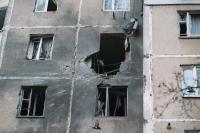
Deoccupied Kherson
Anastasia Vlasova was one of the first photographers who came to Kherson right after its deoccupation on 11 November 2022. Born and raised in Kherson, she used to refer to her hometown as "a small city where nothing ever happens" and then admits, "until last year, obviously."
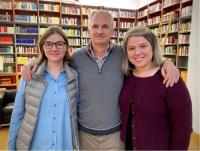
Documenting Ukraine as an Act of Solidarity
Within hours of the start of the full-scale Russian invasion of Ukraine, the IWM made a commitment to increasing our support for Ukrainian intellectuals, building on our tradition of practical solidarity with societies fighting for freedom and our longstanding engagement with Ukrainian academia and civil society. We recognized that chronicling the Russo-Ukrainian War was something that the IWM was uniquely positioned to contribute to.
The Longest February: One Year of Full-Scale War
There has not been a moment since the morning of 24 February 2022 left untouched by the Russo-Ukrainian War. A wry commonplace among Ukrainians is that February 2022 still hasn’t ended – we are now in its 13thmonth. It feels both impossible and essential to reflect on the past year, to think about where we stand now, and to envision the future. Here we present a selection of publications by members of the IWM community tied in some way to the anniversary of Russia’s full-scale invasion of Ukraine, in English and German. Many of the authors represented here are part of the IWM's Documenting Ukraine program. New items are added on an ongoing basis.
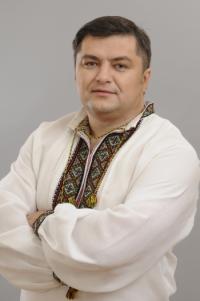
Ihor Bartkiv: "The war must be documented—and someone has to do it"
People who experienced the Russian occupation of Bucha and other towns in the Kyiv region in February-March 2022 are now trying to save themselves mentally rather than physically, seeking refuge from their memories. The rapid reconstruction of the city, which so captivated outside observers, is also a way to try to return to “pre-February 24” Bucha. The archivists and regional experts who lived through all these horrible events are forced to bring together their personal experiences and their professional duties.
The employees of the Archive Department of the Bucha City Council, where documents of the National Archives are held, have spent every day since the very beginning of the full-scale invasion recording events on the spot, taking photographs, capturing video footage. Now the Archive Department is cataloging these materials and providing information to journalists, to legal experts who are investigating war crimes, and to other interested parties. The head of the Archive Department of the Bucha City Council, Ihor Bartkiv, discusses his experience in Bucha under occupation by Russian forces.

Why Documenting Ukraine? Bearing Witness through Culture and Scholarship
The IWM launched Documenting Ukraine in March 2022 to contribute to creating a record of the Russo-Ukrainian War, capturing the human experience of that war, and making it accessible and comprehensible to the broader world. Since then, we have supported 192 projects proposed by Ukrainian scholars, creative professionals, journalists, public intellectuals, and preservation experts that establish and preserve a factual record or bring meaning to events through artistic interpretation and intellectual reflection. Ultimately, the materials collected and produced through these projects will be housed in a complex, transdisciplinary archive.
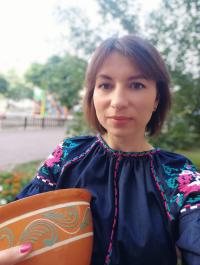
Olena Braichenko: "There is a love and care that can be shown to others precisely through food"
“ïzhakultura” is an independent project about food culture that was founded by Olena and Artem Braichenko in 2017. It is the first resource in Ukraine dedicated to the history of Ukrainian cuisine, where scholars, chefs, food critics, and food anthropologists discuss history, culture, and art through the prism of food. Over the five years of its existence, ïzhakultura has included gastronomy research, the publishing house ïzhak, and numerous thematic events, which not only deepen Ukrainians’ knowledge of their own culture, but also tell the world about Ukraine. Here Olena Braichenko talks about ïzhakultura’s work since February 24.
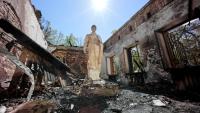
The Voices of Kharkiv: Reconstructing Everyday Life in Wartime
Since February 24, 2022, Kharkiv, the second-largest city in Ukraine with a population of 1,5 million, has been undergoing daily shelling, missile attacks, and unprecedented destruction. Only 40 kilometers from the Russian border, the city was considered an easy target for the Russian forces, who expected the largely Russophone residents to welcome them as liberators. Far from that, the city mobilized to fight the invaders and resists heroically for nearly ten months of the war.
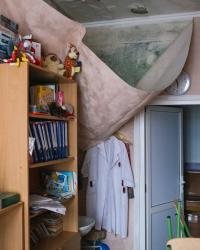
Education in the Shelter: Testimonies of Teaching and Learning during the War
University professors teaching classes from trenches, children doing homework by candlelight, teachers giving lectures after being evacuated from their hometowns – this is the new “normal” of Ukrainian education. According to the Ministry of Education and Science of Ukraine, as of late October 2022 2,677 schools and universities have been damaged by the war and 331 have been destroyed. More than half a million students and over 25,000 teachers fled abroad as refugees.
But while the education process continues online and in hybrid forms, there is an acute need to understand and assess the experiences and needs of students and faculty. Documenting Ukraine supports several initiatives that collect testimonies and record such experiences.
